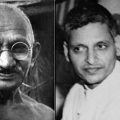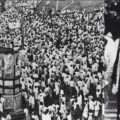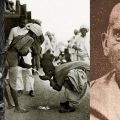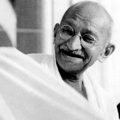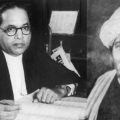Ambedkar’s Dislike of Gandhi and His Support to Nathuram Godse’s Critique
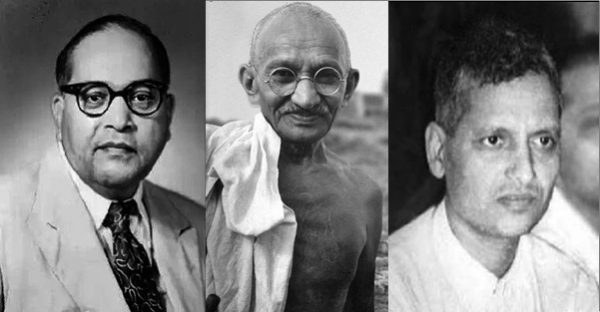
Nowadays, Hindutva activists often use Dr. Bhimrao Ambedkar, a leader of the former Untouchables, as a shield: he is above criticism, a kind of secular saint, and on some points he defended the line which would now be denounced as “Hindu communalist.” Ambedkar is well-known for opposing Mahatma Gandhi’s paternalistic views on the liberation and uplift of the untouchables particularly with his acceptance of the Communal Award giving separate electorates to the untouchables.
His bitter dislike of Gandhi became even more intense when Gandhi forced (“blackmailed,” according to Ambedkarites) him by means of a five-day “fast unto death” to abandon the separate electorates in favour of a compromise known as the Poona Pact of 1932, amounting mainly to reservations for untouchables in parliamentary seats and job recruitment. But the rights of the untouchables were not his only point of difference with Gandhi.
The Mahatma has often been accused of Muslim Appeasement, most pointedly by Nathuram Godse, and Dr. Ambedkar made that criticism his own. Indeed, his lengthy survey of the evolution of Hindu-Muslim relations ever since Gandhi’s appearance on the Indian political scene is in exactly the same scathing tone as Godse’s apology, and drives home the same point: that Gandhi was unrealistic and foolhardy in his pursuit of Muslim support at the expense of Hindu lives and interests.
Dr. Ambedkar is actually more radical than Nathuram Godse, who never rejected the possibility of Hindu-Muslim unity, merely Gandhi’s handling of this project. He quotes an editorial of the Congressite newspaper Hindustan (1926), which draws some lessons from the unrelenting communal violence: “To talk about Hindu-Muslim unity from a thousand platforms or to give it blazoning head-lines is to perpetrate an illusion whose cloudy structure dissolves itself at the exchange of brickbats and the desecration of tombs and temples.” And he comments: “Nothing I could say can so well show the futility of Hindu-Muslim unity. Hindu-Muslim unity upto now was at least in sight although it was like a mirage. Today it is out of sight and also out of mind.”
Dr. Ambedkar quotes a number of statements by Muslim political and religious leaders showing that Hindu-Muslim co-existence in one independent state is impossible because the Muslims will settle for nothing less than to be the rulers. For instance, Maulana Azad Sobhani is quoted as saying, with a typical pan-Islamic outlook: “Our big fight is with the 22 crores of our Hindu enemies, who constitute the majority (…) if they become powerful, then these Hindus will swallow Muslim India and gradually even Egypt, Turkey, Kabul, Mecca (…) So it is the essential duty of every devout Muslim to fight on by joining the Muslim League so that the Hindus may not be established here and a Muslim rule may be established in India as soon as the English depart.”
Dr. Ambedkar seconds Mrs. Annie Besant’s warning: “It has been one of the many injuries inflicted on India by the encouragement of the Khilafat crusade, that the inner Muslim feeling of hatred against ‘unbelievers’ has sprung up, naked and unashamed (…) We have seen revived, as guide in practical politics, the old Muslim religion of the sword (…) In thinking of an independent India, the menace of Mohammedan rule has to be considered.”
The point she makes is not that Islamic dreams of world conquest are inevitable, on the contrary, she attributes the revival of such dreams to the contingent impact of Gandhi’s maladroit Khilafat campaign.
Ambedkar totally rejected the facile explanation, still repeated by today’s Nehruvian secularists (and by Nathuram Godse), that the cause of the communal problem could be found in British “divide and rule” policies: “The Hindus say that the British policy of ‘divide and rule’ is the real cause of this failure [of Hindu-Muslim unity]. But time has come to discard the facile explanation so dear to the Hindus (…) What stands between the Hindus and Muslims is not a mere matter of difference, and this antagonism is not to be attributed to material causes. It is formed by causes which take their origin in historical, religious, cultural and social antipathy, of which political antipathy is only a reflection.”
Among the non-Muslim leaders, Dr. Ambedkar was probably the only one who accepted the Partition of India before the power shift to the League’s advantage of 1939-44 and the bloody events of 1946-47 more or less forced the acceptance of Partition on India’s political class. At that point, of course, he was poles apart with the Hindu nationalists. In a lengthy chapter, Ambedkar argued that neither Savarkar nor Mahatma Gandhi had a solution for the problem that Muslims were unwilling to live in peace as a minority in a secular state.
He even says that suppression of a minority (which, according to him, was not Savarkar’s intention), of which “the aim is to bring into being one nation,” is preferable to having two distinct nations living together in one state. Ambedkar envisaged Partition as a complete territorial separation of Hindus and Muslims, implying an exchange of Population between truncated India and Pakistan. He had worked this out in detail, with blueprints for the transfer of pension rights and property rights. It is quite likely that the implementation of his plan for an orderly division, with an orderly exchange of population, would have saved hundreds of thousands of lives. By contrast, Gandhi’s and Nehru’s refusal of this exchange, effectively sacrificing the Hindus in Pakistan to the dogma of Hindu-Muslim unity, made them responsible for the deaths of hundreds of thousands of innocent people.
The above article is an excerpt from the book Mahatma Gandhi and His Assassin, authored by Koenraad Elst. The author, a Belgian orientalist and Indologist, is well known for his writings on Indian History, Hindu-Muslim relations, and comparative religion.
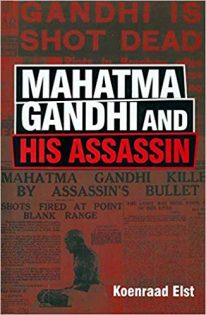
Click here to buy Mahatma Gandhi and His Assassin, published by New Delhi based ‘Voice of India’.
Featured image courtesy: Pinterest and QuotesNew.com.
Disclaimer: The views expressed here are solely excerpt from a book. My India My Glory does not assume any responsibility for the validity or information shared in this article as excerpts from the book.

